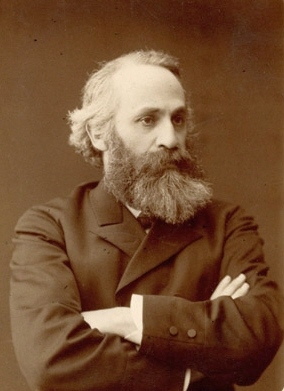Karl Klindworth and Karl Davydov: Difference between pages
| Line 1: | Line 1: | ||
{{picture|file=Karl | __NOTOC__ | ||
{{picture|file=Karl Davydov.jpg|caption='''Karl Davydov''' (1838-1889)}} | |||
Russian cellist, composer and conductor (b. 15/27 March 1838 at Goldingen, Courland [now Kuldiga, Latvia]; d. 14/26 February 1889 in [[Moscow]]), born '''''Karl Yulyevich Davydov''''' (Карл Юльевич Давыдов). | |||
The son of a Jewish doctor and amateur violinist, Yuly Petrovich Davidhoff (1804–1870), and his wife Doroteia (b. Mikhaylovich, 1802–1864), Karl was educated at the Nikolayevsky Institute in [[Moscow]]. He graduated from [[Moscow]] University in 1858 with a degree in mathematical science. However, his interest in music had developed from an early age, and he had given his first solo recital at just fourteen. After studying at the [[Leipzig]] Conservatory with Moritz Hauptmann, he was invited by [[Anton Rubinstein]] to become professor of cello at the [[Saint Petersburg]] Conservatory in 1863. From 1878 until 1886 he was also the conservatory's director. As a conductor and member of a string quartet, Davydov was among the first to perform Tchaikovsky's works, and the latter called him "The emperor of all cellists in our century". | |||
In 1880, Davydov agreed to relinquish [[Viktor Burenin]]'s libretto for the opera ''[[Mazepa]]'' in Tchaikovsky's favour, and the latter dedicated his ''[[Italian Capriccio]]'', Op. 45 (1880) to Davydov. After his resignation from the conservatory, Davydov continued to compose and give concert tours in Russia and the West. | |||
==Dedications== | ==Dedications== | ||
Tchaikovsky dedicated | In 1880, Tchaikovsky dedicated his ''[[Italian Capriccio]]'', Op. 45, "À Monsieur Charles Davidoff". | ||
==Correspondence with Tchaikovsky== | ==Correspondence with Tchaikovsky== | ||
13 letters from Tchaikovsky to Karl Davydov have survived, dating from 1872 to 1886, all of which have been translated into English on this website: | |||
* '''[[Letter | * '''[[Letter 264]]''' – 2/14 June 1872, from [[Kiev]] | ||
* '''[[Letter | * '''[[Letter 451]]''' – 6/18 March 1876, from [[Moscow]] | ||
* '''[[Letter | * '''[[Letter 508]]''' – 18/30 October 1876, from [[Moscow]] | ||
* '''[[Letter | * '''[[Letter 950]]''' – 25 October/6 November 1878, from [[Saint Petersburg]] | ||
* '''[[Letter 1414]]''' – 25 January/6 February 1880, from [[Rome]] | |||
* '''[[Letter 1464]]''' – 1/13 April 1880, from [[Saint Petersburg]] | |||
* '''[[Letter 1634]]''' – December 1880, from [[Saint Petersburg]] | |||
* '''[[Letter 1740]]''' – 5/17 May 1881, from [[Kamenka]] | |||
* '''[[Letter 2297]]''' – 31 May/12 June 1883, from [[Podushkino]] | |||
* '''[[Letter 2472]]''' – 24 April/6 May 1884, from [[Kamenka]] | |||
* '''[[Letter 2850]]''' – 12/24 January 1886, from [[Saint Petersburg]] | |||
* '''[[Letter 2902]]''' – 28 February/12 March 1886, from [[Maydanovo]] | |||
* '''[[Letter 2939]]''' – 28 April/10 May 1886, from [[Tiflis]] | |||
6 letters from Karl Davydov to Tchaikovsky, dating from around 1880 to 1891, are preserved in the {{RUS-KLč}} at [[Klin]] (a{{sup|4}}, Nos. 785–790). | |||
==Bibliography== | ==Bibliography== | ||
* {{bib| | * {{bib|1926/17}} (1926) | ||
* {{bib| | * {{bib|1950/20}} (1950) | ||
==External Links== | ==External Links== | ||
* [[wikipedia: | * [[wikipedia:Karl_Davydov|Wikipedia]] | ||
* {{IMSLP| | * {{IMSLP|Davydov,_Karl}} | ||
* {{viaf| | * {{viaf|14999666}} | ||
[[Category:People| | [[Category:People|Davydov, Karl]] | ||
[[Category: | [[Category:Cellists|Davydov, Karl]] | ||
[[Category: | [[Category:Composers|Davydov, Karl]] | ||
[[Category: | [[Category:Conductors|Davydov, Karl]] | ||
[[Category: | [[Category:Correspondents|Davydov, Karl]] | ||
[[Category:Dedicatees|Davydov, Karl]] | |||
Revision as of 21:36, 14 September 2023
Russian cellist, composer and conductor (b. 15/27 March 1838 at Goldingen, Courland [now Kuldiga, Latvia]; d. 14/26 February 1889 in Moscow), born Karl Yulyevich Davydov (Карл Юльевич Давыдов).
The son of a Jewish doctor and amateur violinist, Yuly Petrovich Davidhoff (1804–1870), and his wife Doroteia (b. Mikhaylovich, 1802–1864), Karl was educated at the Nikolayevsky Institute in Moscow. He graduated from Moscow University in 1858 with a degree in mathematical science. However, his interest in music had developed from an early age, and he had given his first solo recital at just fourteen. After studying at the Leipzig Conservatory with Moritz Hauptmann, he was invited by Anton Rubinstein to become professor of cello at the Saint Petersburg Conservatory in 1863. From 1878 until 1886 he was also the conservatory's director. As a conductor and member of a string quartet, Davydov was among the first to perform Tchaikovsky's works, and the latter called him "The emperor of all cellists in our century".
In 1880, Davydov agreed to relinquish Viktor Burenin's libretto for the opera Mazepa in Tchaikovsky's favour, and the latter dedicated his Italian Capriccio, Op. 45 (1880) to Davydov. After his resignation from the conservatory, Davydov continued to compose and give concert tours in Russia and the West.
Dedications
In 1880, Tchaikovsky dedicated his Italian Capriccio, Op. 45, "À Monsieur Charles Davidoff".
Correspondence with Tchaikovsky
13 letters from Tchaikovsky to Karl Davydov have survived, dating from 1872 to 1886, all of which have been translated into English on this website:
- Letter 264 – 2/14 June 1872, from Kiev
- Letter 451 – 6/18 March 1876, from Moscow
- Letter 508 – 18/30 October 1876, from Moscow
- Letter 950 – 25 October/6 November 1878, from Saint Petersburg
- Letter 1414 – 25 January/6 February 1880, from Rome
- Letter 1464 – 1/13 April 1880, from Saint Petersburg
- Letter 1634 – December 1880, from Saint Petersburg
- Letter 1740 – 5/17 May 1881, from Kamenka
- Letter 2297 – 31 May/12 June 1883, from Podushkino
- Letter 2472 – 24 April/6 May 1884, from Kamenka
- Letter 2850 – 12/24 January 1886, from Saint Petersburg
- Letter 2902 – 28 February/12 March 1886, from Maydanovo
- Letter 2939 – 28 April/10 May 1886, from Tiflis
6 letters from Karl Davydov to Tchaikovsky, dating from around 1880 to 1891, are preserved in the Tchaikovsky State Memorial Musical Museum-Reserve at Klin (a4, Nos. 785–790).
Bibliography
- Неизданное письмо Чайковского (1926)
- К. Ю. Лавыдов (1950)

